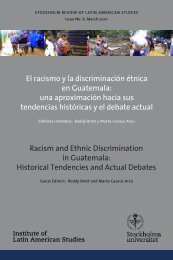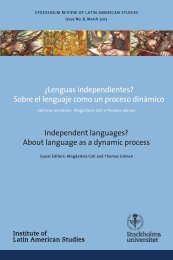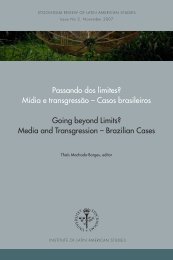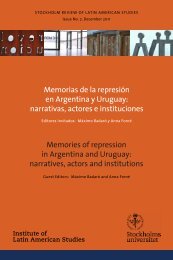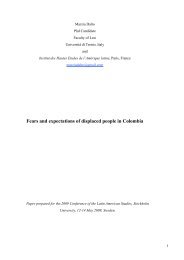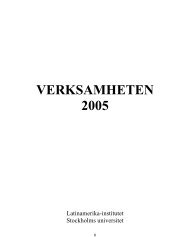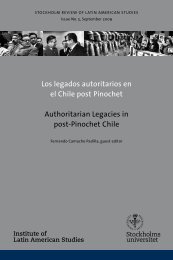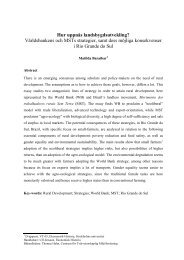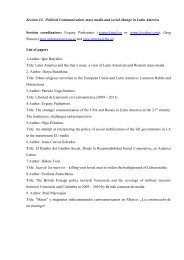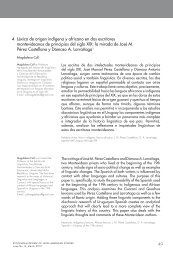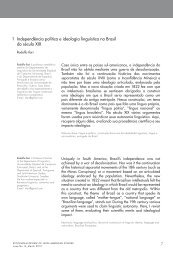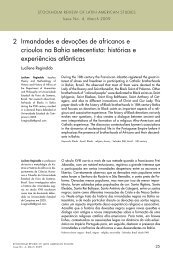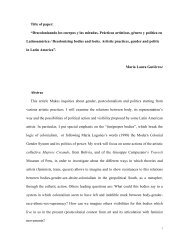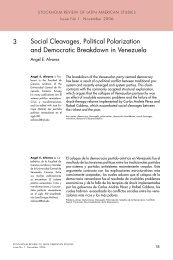Venezuelan Politics and Society in Times of Chavismo PolÃtica y ...
Venezuelan Politics and Society in Times of Chavismo PolÃtica y ...
Venezuelan Politics and Society in Times of Chavismo PolÃtica y ...
Create successful ePaper yourself
Turn your PDF publications into a flip-book with our unique Google optimized e-Paper software.
Social Cleavages, Political Polarization <strong>and</strong> Democratic Breakdown <strong>in</strong> Venezuela<br />
Angel E. Alvarez<br />
some legitimacy, whereas the opposition lost all its<br />
power, but cast some shadows on the transparency<br />
<strong>of</strong> the <strong>Venezuelan</strong> electoral system.<br />
The 2006 Presidential Election: challenges <strong>and</strong> dilemmas<br />
President Chavez has never concealed his electoral<br />
ambitions. Indeed, <strong>in</strong> his Alo Presidente! (Chavez’s<br />
weekly live TV show) on February, 19 2006, the<br />
president voiced his will<strong>in</strong>gness to rema<strong>in</strong> <strong>in</strong> power<br />
<strong>in</strong>def<strong>in</strong>itely. The constitution allows him to run for<br />
president only for a second term, but his followers<br />
<strong>in</strong> the National Assembly have claimed that they<br />
are ready for a new constitutional reform.<br />
Currently, Chavez has no serious challengers. In<br />
his coalition, Chavez is an uncontested leader. The<br />
Vice-President Jose Vicente Rangel <strong>and</strong> many other<br />
party leaders say that Chavez is the only necessary<br />
leader <strong>of</strong> the Bolivarian “process” (see Rangel<br />
2004). Moreover, Chavez is currently the most<br />
preferred c<strong>and</strong>idate. Accord<strong>in</strong>g to Alfredo Keller<br />
(2005) Chavez is supported by 55% <strong>of</strong> the voters,<br />
whereas the most popular <strong>of</strong> his opponents (Julio<br />
Borges, from MPJ) is backed by 10% <strong>of</strong> the citizens.<br />
Thus, Chavez will probably w<strong>in</strong> with no effort.<br />
However, Chavez not only needs to w<strong>in</strong> the elections,<br />
he requires massive support. His proclaimed<br />
goal is to ga<strong>in</strong> 10 million votes out <strong>of</strong> a total 14<br />
million potential voters. Thus, his most important<br />
enemy is not the opposition, but the abstention. The<br />
2005 parliamentary elections demonstrated that his<br />
immense <strong>and</strong> expensive political apparatus (the socalled<br />
UBE, Unities <strong>of</strong> Electoral Battle) does not<br />
necessarily guarantee a massive turnout.<br />
However, previous elections have taught him<br />
to take advantage <strong>of</strong> <strong>in</strong>flammatory <strong>and</strong> polariz<strong>in</strong>g<br />
rhetoric. S<strong>in</strong>ce 1998, <strong>Venezuelan</strong> voters have turned<br />
out when the elections have been competitive <strong>and</strong><br />
polarized. Thus, Chavez desperately will need a<br />
challenger if he wants to use the 2006 elections as<br />
a renew showcase for the legitimacy <strong>and</strong> strength<br />
<strong>of</strong> the Bolivarian revolution. Yet, opposition leaders<br />
<strong>and</strong> traditional parties are no longer a credible<br />
threat to Chavez’s revolution.<br />
The opposition leadership is weak <strong>and</strong> volatile.<br />
At least seven challengers are runn<strong>in</strong>g for president.<br />
Some <strong>of</strong> them might give up very soon, but probably<br />
some others will emerge. Opposition c<strong>and</strong>idates<br />
are ideologically diverse. One <strong>of</strong> them, Teodoro<br />
Petk<strong>of</strong>f, is from the center-left. He is an economist<br />
<strong>and</strong> newspaper editor, who was a guerrilla leader <strong>in</strong><br />
the 1960`s, a former leader <strong>of</strong> a socialist party, <strong>and</strong><br />
the M<strong>in</strong>ister <strong>of</strong> Plann<strong>in</strong>g dur<strong>in</strong>g the macroeconomic<br />
adjustment <strong>of</strong> 1996 to 1997. Another c<strong>and</strong>idate,<br />
William Ojeda, is from a more radical <strong>and</strong> former<br />
chavista left-w<strong>in</strong>g part (Un Solo Pueblo). The most<br />
right-w<strong>in</strong>g c<strong>and</strong>idate, Roberto Smith, is a technocrat<br />
mathematician who was a member <strong>of</strong> economic<br />
team that implemented a “shock-therapy” program<br />
dur<strong>in</strong>g Carlos Andrés Pérez adm<strong>in</strong>istration.<br />
Julio Borgers, is a lawyer <strong>and</strong> leader <strong>of</strong> the MPJ,<br />
<strong>and</strong> Manuel Rosales is currently a governor <strong>and</strong> the<br />
ma<strong>in</strong> leader <strong>of</strong> a regional <strong>and</strong> personalistic party,<br />
(Nuevo Tiempo). Petk<strong>of</strong>f <strong>and</strong> Ojeda have strongly<br />
criticized corruption, <strong>in</strong>efficiency <strong>and</strong> populism <strong>in</strong><br />
Chavez adm<strong>in</strong>istration, but both <strong>of</strong> them have remarked<br />
the relevance <strong>of</strong> Chavez’ social reforms.<br />
They also have supported the ultra-nationalist foreign<br />
police <strong>of</strong> Hugo Chávez. On the other h<strong>and</strong>,<br />
Smith has emphasized the virtues <strong>of</strong> the orthodox<br />
economic policies. Borges <strong>and</strong> Rosales have said<br />
almost noth<strong>in</strong>g about economics <strong>and</strong> social programs.<br />
However, Rosales explicitly supported the<br />
2002 coup d'état led by powerful bus<strong>in</strong>essmen <strong>and</strong><br />
right-w<strong>in</strong>g military. Borges <strong>and</strong> Ojeda participated<br />
<strong>in</strong> demonstrations <strong>and</strong> popular upheavals <strong>in</strong> 2002<br />
<strong>and</strong> 2003, whereas Petk<strong>of</strong>f <strong>and</strong> his newspaper (Tal<br />
Cual) condemned the coup, claimed for moderation,<br />
<strong>and</strong> proposed democratic ways out <strong>of</strong> the crisis.<br />
Borges is member <strong>of</strong> a national party, whereas<br />
the others are <strong>in</strong>dependent (Petk<strong>of</strong>f <strong>and</strong> Smith) or<br />
leaders <strong>of</strong> small personalistic parties (Rosales <strong>and</strong><br />
Ojeda).<br />
Most <strong>of</strong> these c<strong>and</strong>idates have declared that the<br />
opposition should have only one c<strong>and</strong>idate, but still<br />
they have found no solution to their problems <strong>of</strong><br />
coord<strong>in</strong>ation. S<strong>in</strong>ce political parties are no longer<br />
able to enforce discipl<strong>in</strong>e <strong>and</strong> political agreements,<br />
these c<strong>and</strong>idates have been explor<strong>in</strong>g other <strong>in</strong>stitutional<br />
solutions. Some <strong>of</strong> them have proposed a primary<br />
election; some others prefer a national public<br />
Stockholm REVIEW OF Lat<strong>in</strong> American Studies<br />
Issue No 1. November 2006<br />
26



